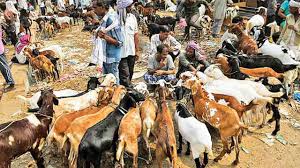The Animal Welfare Board of India (AWBI) is launching a campaign to crack down on the slaughter of animals for sacrifice, ahead of the Muslim festival of Bakrid, or Eid al-Adha (festival of sacrifice), which will be celebrated on August 21-22. Volunteers of the agency will watch out for and report any instances of cruelty to animals.
“If anyone does animal sacrifice, that is punishable, no animal is exempted.” said SP Gupta, chairman of the board, a statutory advisory body under the union environment ministry. “People are not aware, they link it to religion, but this is not a religion thing. In no religion can you kill animals.”
Bakrid is one of the biggest Muslim festivals, celebrated traditionally with an animal sacrifice. In Uttar Pradesh last year, ahead of the festival, a number of prominent Muslim organisations and leaders urged the followers of Islam to avoid offering animal sacrifices on roads, and to maintain hygiene, exercise restraint and not give a reason to people of other communities to complain.
“Whatever people might say, the context of this campaign is that it is directed at communities that have this as part of their tradition, especially the Muslim community,” Harsh Mander, director, Centre for Equity Studies, said. “ This idea that animal protection is what is motivating us, is a very thin one.”
There is no blanket ban on animal sacrifice in India. The controversial Prevention of Cruelty to Animals (Regulation of Livestock Markets) Rules 2017, notified by the environment ministry, banned the sale of cattle, including bulls, bullocks, cows, buffaloes, steers, heifers and calves, and camels for slaughter, including for religious purposes.
The rules were criticised for squeezing supplies to India’s meat industry, which employs mostly Muslims, and for hurting farmers who find it difficult to deal with non-milch cattle. The clause on sacrifice under the rules was stayed by the Supreme Court and later the rules were themselves sought to be replaced with regulations diluted by the environment ministry, dropping the slaughter provision altogether.
According to Gupta, provisions exist under various other laws on the slaughter of animals and specific guidelines within the Prevention of Cruelty to Animals which, if strictly imposed, rule out sacrifices. “There is no ban per se. If it is in your religion, then there is a criteria on how to kill animals that no one follows,” Gupta said.
Under provisions of the Prevention of Cruelty to Animals Rules and food safety standards, animals must be slaughtered at registered abattoirs and follow certain guidelines, but in the case of most ritualistic animal sacrifices these rules are not followed.
Animal rights activist organisations like the Indian chapter of the People for the Ethical Treatment of Animals (PETA) oppose animal sacrifice. “We are against all kinds of animal sacrifice. It is illegal and cruel,” Manilal Valliyate, CEO of PETA India, said.
Mohammed Abdul Faheem Qureshi, an advocate and president of the All India Jamiatul Quresh Action Committee,who had challenged the centre’s controversial cattle trade rules in the Supreme Court, is critical of the AWBI campaign that he alleges also targets Muslims. The committee calls itself a social organisation.
“They are only concerned about cattle, they are targeting the Muslim community,” Qureshi, said. “If they impose the provisions, every action will be an offence.”
The AWBI is only an advisory agency but it has a wide mandate under the Prevention of Cruelty to Animals and is able to recruit functionaries at the state and district levels to keep an eye on violations of provisions under the act.
“If the state government does not act on complaints, we will act. We will file complaints with law enforcement (authorities), and if that does not work we will file cases in court against the authorities,” Gupta said.






